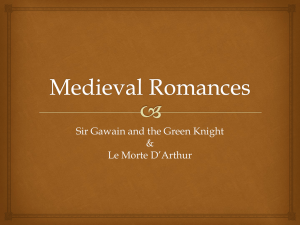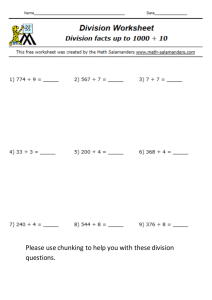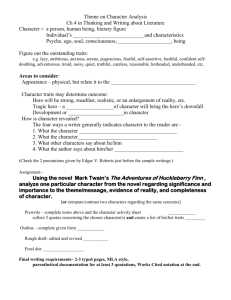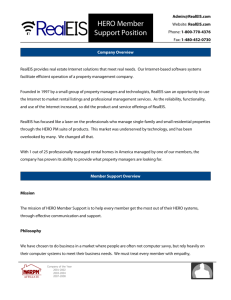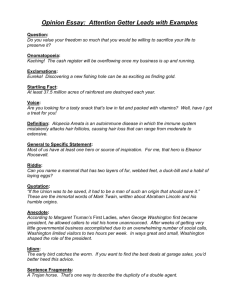The Hero Moment - Charles W. Johnson
advertisement
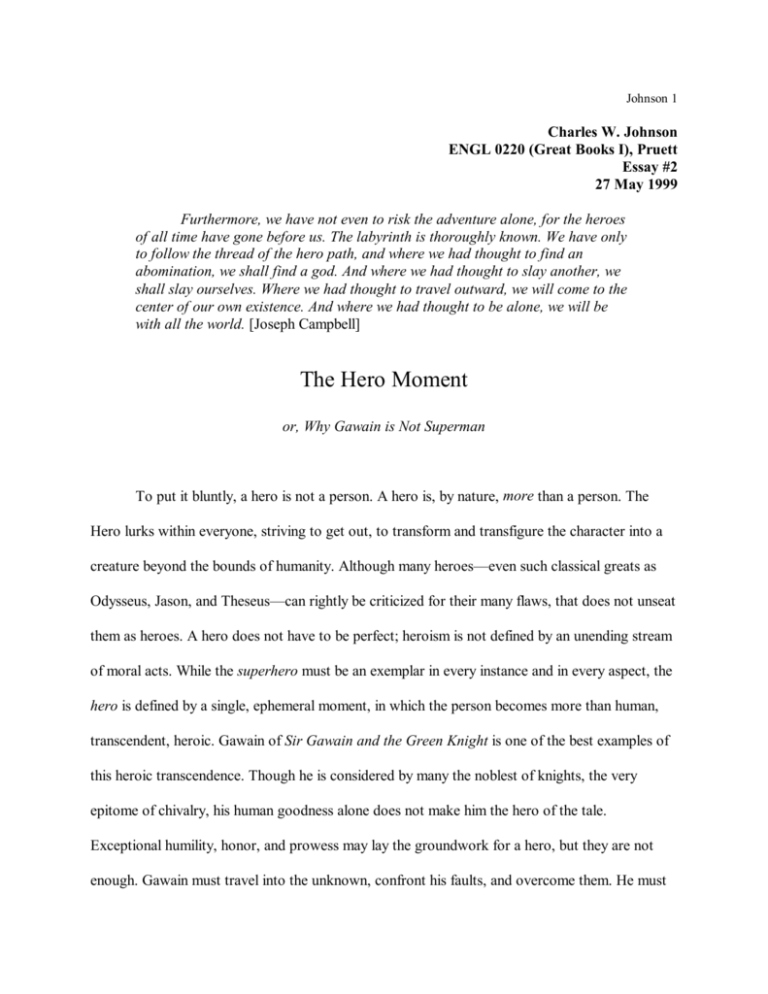
Johnson 1 Charles W. Johnson ENGL 0220 (Great Books I), Pruett Essay #2 27 May 1999 Furthermore, we have not even to risk the adventure alone, for the heroes of all time have gone before us. The labyrinth is thoroughly known. We have only to follow the thread of the hero path, and where we had thought to find an abomination, we shall find a god. And where we had thought to slay another, we shall slay ourselves. Where we had thought to travel outward, we will come to the center of our own existence. And where we had thought to be alone, we will be with all the world. [Joseph Campbell] The Hero Moment or, Why Gawain is Not Superman To put it bluntly, a hero is not a person. A hero is, by nature, more than a person. The Hero lurks within everyone, striving to get out, to transform and transfigure the character into a creature beyond the bounds of humanity. Although many heroes—even such classical greats as Odysseus, Jason, and Theseus—can rightly be criticized for their many flaws, that does not unseat them as heroes. A hero does not have to be perfect; heroism is not defined by an unending stream of moral acts. While the superhero must be an exemplar in every instance and in every aspect, the hero is defined by a single, ephemeral moment, in which the person becomes more than human, transcendent, heroic. Gawain of Sir Gawain and the Green Knight is one of the best examples of this heroic transcendence. Though he is considered by many the noblest of knights, the very epitome of chivalry, his human goodness alone does not make him the hero of the tale. Exceptional humility, honor, and prowess may lay the groundwork for a hero, but they are not enough. Gawain must travel into the unknown, confront his faults, and overcome them. He must Johnson 2 allow the hero to break loose. Gawain’s first “hero moment” comes at the feast in the opening scene of the poem. The Green Knight bursts into King Arthur’s hall, proposing a bizarre “game:” If there be one so wilful my words to assay, Let him leap hither lightly, lay hold of this weapon; I quitclaim it forever, keep it as his own, And I shall stand him a stroke, steady on this floor, So you grant me the guerdon to give him another, sans blame. In twelvemonth and a day He shall have of me the same. (291-298) 1 After the court stands in shocked silence, the Green Knight sneers that “Now are the revel and renown of the Round Table/Overwhelmed with a word of one man’s speech,/For all cower and quake, and no cut felt!” (313-315). Arthur, enraged, agrees to take up the challenge. But King Arthur is the head of state in an uncertain time, and the disastrous consequences of his death cannot be allowed. Gawain, in a moment of decision, makes a heroic leap into danger, for the honor of the court, for the safety of the country, and most of all for his own honor. He declares “that this folly befits not a king,/And ‘tis I that have asked it, it out to be mine” (358-359). By overcoming his own fear, and by giving himself to a greater glory, he breaks out and becomes a hero. 1 All references are to Sir Gawain and the Green Knight: A New Verse Translation, trans. Marie Borroff. New York: W. W. Norton & Company, Inc. 1967. Johnson 3 As Gawain rides off towards his fate, he must make a long trek through the wilderness to find the mysterious Green Chapel. He is beset with trouble after trouble; “At each strand or stream where the stalwart passed/’Twere a marvel if he met not some monstrous foe,/And that so fierce and forbidding that fight he must” (715-717). But Gawain’s travails in the wilderness, his fantastic deeds of strength, endurance, and prowess with arms, are given a remarkably short treatment: in a poem of 2530 lines, only fourty-nine lines—one stanza—are devoted to his two months in the wilderness, from All Hallows’ Day to Christmas Eve (691-739). Here the poem is clear in its paucity: battle does not make one a hero. The quest does not make one a hero, no matter how hard. All that matters is Gawain’s willing leap into the darkness, his resolve to go meet his fate at the Green Chapel. The beasts that he slays and the weather that he endures along the way are not what makes him a hero. Reaching the Green Chapel, the deepest point of his descent into the valley of death (represented physically by the valley in which the Chapel lies), Gawain comes to his consummate “hero moment” in his final decision to face his fate. As he and his guide ride to the edge of the valley, the guide urges him to turn back and “let the grim man be;/Go off by some other road, in God’s own name!” (2118-2119). The guide promises to tell that Gawain did face the Green Knight, and leaves Sir Gawain alone to ponder the decision. Gawain is faced with two roads, physically and allegorically; he can choose to turn back in cowardice, or go forth and face his destiny. Alone, he “puts his heels to his horse, and picks up the path” (2160) leading down towards the Green Chapel. Despite any of his failings, despite his triple sin against his host and knightly honor, in that moment Gawain is a hero; Gawain is The Hero. It is that choice, away from cowardice and straight into the teeth of danger, questing for one’s self, that defines the hero. Johnson 4 No prior or subsequent moral failure can overcome it. Indeed, Gawain does fail to meet the superheroic standard of perfection. In concealing the green girdle from his host, he displays cowardice, lies, and betrays his word. But this humanity does not prevent him from being a hero; more than anything, it allows him to be one. It allows him to give himself up in a moment of penitence; he turns away from self-serving cowardice and declares, “I confess, knight, in this place,/Most dire is my misdeed;/Let me gain back your good grace” (2385-2387). In his act of penitence, he overcomes his human fallibility, and the Green Knight considers him “polished as a pearl” (2393). But even more important than the minor hero moment that his sins allow is that his sins make Gawain human. A superhero cannot be human, but a hero must be; it is not in being perfect that a hero succeeds, but in having human limitations and in overcoming them. A superhero slays monsters; a hero slays himself: in the hero moment, he makes the critical descent into the valley, and destroys his limited being. Because the Superhero is nothing more than a theophany, a being from another realm who condescends to dirty himself with human affairs, he is a limited occurrence in mythology. More than anything, he appears in comics and other adolescent 2 narratives, as a deus ex machina to right the oppressive and inexorable world . But because the hero is one of us, because his quest for self-conquering is our quest, he and his quest are one of the most universal themes of mythology and of literature. It is by winning within our own limitations that The Hero reasserts his emotive power from Gilgamesh to Star Wars. That, and nothing more, is the heroic victory. It is a descent into the darkest danger and, 2 I would argue that this appeals most to home-bound adolescents who have begun to chafe against the seemingly insurmountable pressure of Authority; the superhero is ultimately empowered, and speaks to the yearnings of the disenfranchised. Johnson 5 by that willing descent, a return as the new being. It is the hero moment that matters; Gawain’s failing cannot overcome his victory. Indeed, the Knights of the Round Table adopt the green girdle, the symbol of Gawain’s humanity—and thus of his heroic transcendence—as “a token by the Table Round,/And he honored that had it” (2519-2520). What Gawain saw as the “blazon of his blemish” (2506), the Knights recognized as the token of his humanity and of the quest that exposed it and overcame it: that is, the token of his heroism.


